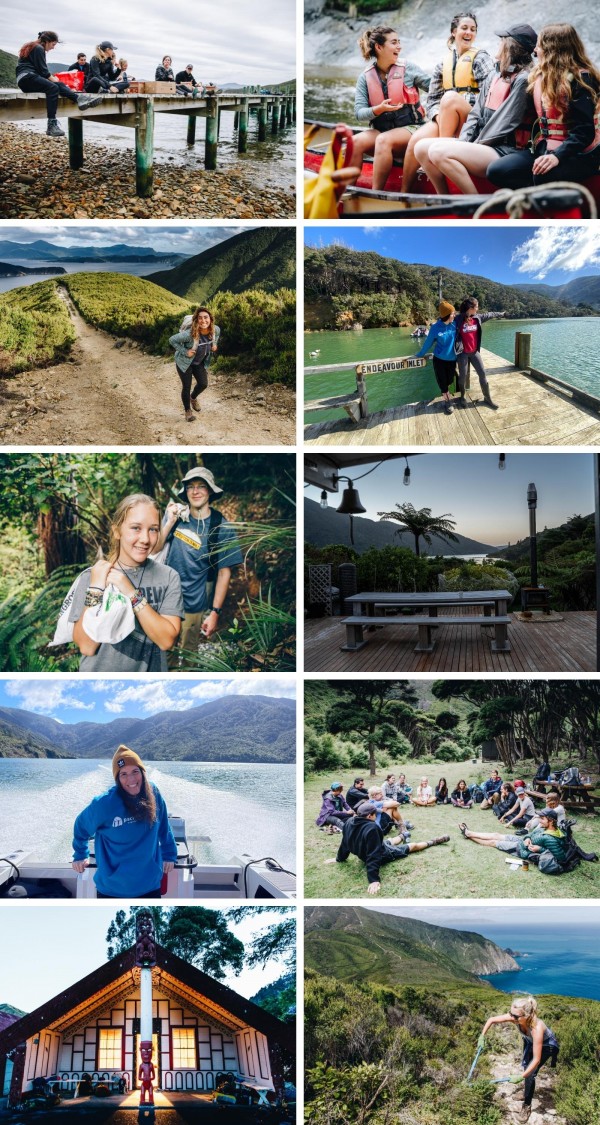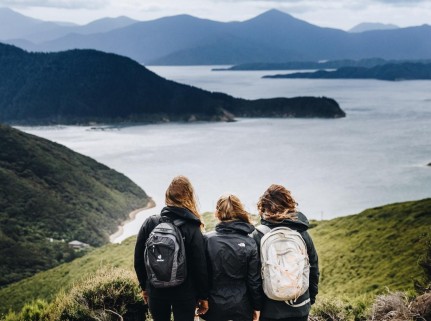
Our philosophy is that we are all wild at our core. Sometimes life is a bit fast-paced to soak in the magical world surrounding us, so this program intentionally creates space to go deep into nature, 'rewild' yourself and the earth around you. On a remote wilderness homestead touching the pristine ocean of the Marlborough Sounds, you will be living in yurts honing sustainable living practices, hands-on farming experience, restoring flora, eradicating invasive fauna, overnight hiking, and even learning about marine biology while gaining a scuba certification. You will also get to experience three iconic road trips around the North and South Island!
New Zealand has world-class examples of wilderness conservation and our homestead location is at the forefront of these efforts. Through our prestigious partnership with the New Zealand Department of Conservation and Regional Environmental Trusts, you will steward the land through environmental service work with industry professionals. On this unique place-based expedition program, you will embody a Farm to Table lifestyle, delve into global environmental issues, and take a peaceful, collective pause to focus on purpose and value.
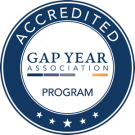
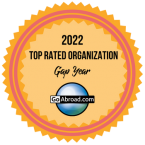
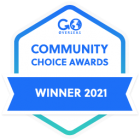
✓ Are excited about getting involved in creative climate solutions
✓ Want to detox from society and spend lots of time in nature
✓ Enjoy space to run free, cultivate connections and create with your hands
✓ Like to invest in inner care and facilitated reflection time
✓ Want to have a deeper understanding of the world around you
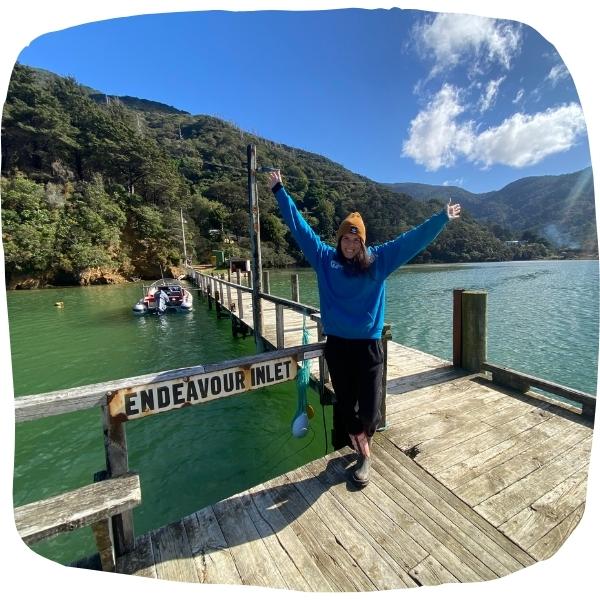
My Pacific Discovery trip was absolutely a life-changing experience. I not only had an excellent time and made 13 new best friends, but also gained perspective that changed the way I look at the world. Meeting people from local communities and learning about their way of life has inspired me to think differently about my own life and about those I meet. Coming home from this trip, I am more thoughtful, inquisitive, independent, and mature and will be much better prepared to handle what the future brings."
- Emily Bosworth
Our Program Quiz can help you find your perfect Program match! Or get the full Program run-down in our catalogue. This catalogue provides information about Pacific Discovery's values and program design, as well as program descriptions and testimonials!
We will start off with a jam-packed adventure week, road-tripping down the culture-rich North Island of New Zealand to arrive at our wilderness homestead. We will travel from stunning Auckland to the heart of the North Island and immerse ourselves in a sacred ‘marae’ (Maori meeting ground), partaking in cultural performances and learning about the Polynesian ancestral roots of the Maori people who populate New Zealand.
Rotorua also happens to be an internationally renowned mountain biking destination - so we will make the most of the trails as well as raft down the world's highest commercial waterfall on the Kaituna River. We'll take in the otherworldly region of geothermal bubbling and steaming hot pools around Lake Taupo. As long as the weather gods allow, students will get out for a hike in the World Heritage-listed volcanic Tongariro National Park. At the southern tip of the island, we will explore the hipster grunge/industrial capital of Windy Wellington. This is where we visit the interactive national museum Te Papa, rated one of Lonely Planet's 500 best places on earth. We end the week with a ferry ride between the islands that connect the land of the long white cloud to arrive at the unbelievably picturesque Marlborough Sounds.
We get dropped off by speedboat partway along the Queen Charlotte track and arrive at Endeavour Inlet to see our new home for the next two months. It’s common to see seals and dolphins on this boat ride through the Sounds! The spectacular wilderness homestead is set right on the Queen Charlotte track, nestled in an intricate web of inlets evocative of a Norwegian fjord. Unpacking bags and settling into the yurts at the homestead is like taking a huge metaphorical load off. There are luscious green mountains, fluffy merino sheep, quirky ‘kiwi’ neighbors, thriving orchards, epic mountain biking, and walking tracks right on the doorstep. Not to mention, the homestead is equipped with bikes, kayaks, and SUPs for exploring!
We will take some time to settle into our new space; finding daily and weekly rhythms. This week is focused on learning all of the sustainable living practices that will flow on through the program. There are daily briefs to manage the homestead together where we get hands-on experience in gardening, worm composting, recycling, feeding the chickens, keeping bees, and planning and creating meals together. We will also work together to develop seasonal projects that might include anything from building a pizza oven and hosting a dinner party to building a greenhouse garden - the choice is yours! The idea is for everyone to try something new, make mistakes, have a laugh, and learn together. There will be a focus on inner care, in which students can find their own routine of yoga, journalling, or self-expression. In a world of fast-paced exposure, this program places value on slowing down and stewarding the land.
We are settling into the homestead, with morning walks on the Queen Charlotte Track, summer swims and picnics, collecting fresh eggs from the chickens, and getting the lay of the land. The learning focus for the week is to get the whole picture about mammal ecology and biodiversity loss specific to New Zealand. One of the major aims in this area is to protect long-tailed bats and other wildlife by trapping predators. Our philosophy is to combine learning with doing in our planned weekly modules. Regional Conservation Trusts will be onsite to teach us about New Zealand’s history and the effects of invasive animals which include pigs, goats, deer, rats, possums, stoats (a kind of naughty weasel), and cats. We will be doing hands-on work that is invaluable to New Zealand’s conservation goals. Undertaking this work is physical, practical, rewarding, and meaningful.
This program is all about asking questions, linking theory and practice, connecting with the land here, and applying the learnings to life back home. We will keep up the daily pulse of sustainable living skills. We will also cook a traditional Maori 'hangi' feast, where produce is cooked in an underground earthen oven. It's also a great time to dive into an elective, whether it's Artistic Expression, Farm to Table exploration, or Plant Uses. There will be an ongoing exploration of self with a Core Curriculum, and exploration of the environment with hands-on activities and interactive facilitated workshops.
This week is about getting out into the pristine wilderness. We will be very familiar with the Endeavour Inlet from all the exploring that’s been happening to this point, but the Epic Expedition Week goes further afield and includes overnight camping. Once prepared, we will head out on a supported four-day hike, bike, and kayak through the iconic Marlborough Sound on the Queen Charlotte Track.
This expedition is not only a unique experience in a spectacular location, but students will really get to know their own backyard and test some of their own limits. Bushcraft skills will be honed this week through map reading, camping in tents, and whittling knives. The outdoor module sets students up to go on multi-sport, multi-day missions in different types of conditions. Modules are absolutely flexible according to the weather and other influences, ensuring students get the best experience possible. Flexibility is a huge advantage of the residential rewording program, as it is not a possibility in traditional overland programs.
We will take our newfound conservation skills to undertake environmental service work in conjunction with the New Zealand Department of Conservation. The Natural Resources Conservation Internship will be supporting the government organization across a range of services that are required at the time, from track building and maintenance on the Queen Charlotte Track to endangered bird surveys on islands in the Sounds. We will travel to world-class examples of pest-free environments such as Motuara Island (home to little penguins) and Lochmara reserve.
We will be working alongside New Zealand experts in the field of environmental sustainability, and students can learn about what projects they have worked on over morning tea. In the afternoon after the service learning project is done for the day, we will continue to explore our stomping ground. Each week there is a carved out ‘intentional’ day, in which students are free to be self-directed; it’s encouraged to have a focus and plan it out. An example of an intentional day might be a day hiking and fishing, or a trip to Picton for a movie.
Time for an excursion! This week we will get picked up by a speedboat and head out for a wilderness road trip through the Central South Island. Along the way, we stay in hostels and campgrounds to experience the best of a New Zealand road trip that draws in millions of people globally around the world.
In the Blenheim region, we will head to one of the famous wineries to learn about biodynamic farming, in the Abel Tasman National Park we head out for a hike, in Hokitika we carve our own knife or jade piece, on the west coast we admire the ethereal Pancake Rocks, at a high country farming station we shear a sheep and in Hanmer Springs we take a relaxing dip in the hot pools before returning to the wilderness homestead. We must be sure to take a camera because driving through New Zealand's rolling hills and mountains will offer some of the most beautiful landscapes in the world!
Back at the homestead, this week is all about immersion in the underwater environment. We will learn marine science and biology relevant to the local area, and scuba diving is a wonderful element of this learning. A scuba diving instructor will be onsite to teach diving with a strong marine biology and science focus, and we have the opportunity to put our newfound skills to the test by diving off the pristine shore of the homestead. Whilst half the group is diving, the other half can snorkel and forage for pawa (abalone) and mussels.
This week, we also head out on a full-day fishing charter on a fully equipped boat. Being self-sufficient in the wild is not only sustainable but empowering. This deep dive week will culminate in a Farm to Table Feast, utilizing all the foraging skills we have learned to date! Panko crumbed snapper and pawa fritters, anyone?!
The wilderness homestead area has a multi-faceted history of indigenous occupation, whaling, mining, and pastoral use. The point in history that we have arrived at is environmental protection and sustainability, with an aim to restore the land that was once cleared for human use. This week is focused on replanting native plants in a cleared area and removing invasive plants. More than a quarter of New Zealand is at risk of being smothered by wilding pines - including ancient native landscapes, unique biodiversity, and productive soils for high-value sustainable land use.
We will target the wilding pines and thin out scrub. We're effectively working as stewards of the land, restoring it to its natural state. In a decade from you could return to the Sounds to see the reforested areas that you’ve planted with their own hands! It is a cathartic process to work in unison with the earth, and by caring for the land we are also caring for ourselves and our future. The land around us is a living library; in this module, there are lots of human and textbook resources available to organically hone in on plant uses for food and medicine.
Nature propels you forward in this lifelong skill set that could literally take you anywhere - this week we will learn to sail! The Marlborough Sounds are a sailor's dream! We will gain this practical skillset from a local sailing club, developing communication and leadership skills by directing the crew and working in unison to achieve goals. We will skim along the ocean water in full sunshine in the bay and of course, keep a look out for seals and dolphins swimming about the boats. Sailing on the doorstep of your home is also a whole lot of fun.
We will soak up the sun and say our goodbyes as this will be the last week at the homestead. We finish up any individual projects and look ahead to prepare for next week's student-led portion of the journey. Together, we will create, scheme, budget, plan and book for the upcoming exciting adventure through the South Island. It is bittersweet for us to farewell the homestead we’ve added so much value to, but it’s time to move into the next chapter. Don't worry, there will be caretakers staying onsite to manage the group's gardens, animals, and projects until the next group arrives.
All of the leadership skills and local information harnessed to date will be applied in this self-led section. The aim is to arrive in Christchurch to end the program, and we get to choose our own adventure and self-direct our entire last week together. The instructors will be driving the van, and we will execute the route and activities for the final week of the Residential Wilderness program. Options include cruising Milford Sound, hiking on Franz Joseph Glacier, rock climbing world-class walls in Wanaka, bungee jumping or skydiving in the adventure capital of Queenstown, or picnicking under the looming snowy peak of Mount Cook.
By this stage we will have seen a great deal of New Zealand, road tripping across both islands and taking in the most iconic sites. Taking ownership of the itinerary is empowering for all the life adventures to come. The week will organically involve final reflections and learnings from the time spent delving into New Zealand and oneself. We fly home with lifelong friends, a thousand memories, and lots of practical skills, self-growth, environmental awareness and confidence for everything that lies ahead.
*Each week there will be some designated free time so that you can catch up on email, do laundry, rest, and explore independently with others in the group.
**Pacific Discovery reserves the right to alter and/or change the order of the itinerary, the focus of the projects or the activities themselves due to dates, availability, and safety precautions.
✓ All in-program travel and transport, excluding flights
✓ All accommodation
✓ All meals
✓ All expeditions, activities, excursions, volunteer projects and entry fees as described in the itinerary
✓ Experienced Program Instructors and local guides
✓ Informal lectures from resident experts on conservation and eco-tourism
✓ Experiential core curriculum that pushes students to reflect and ask questions of themselves
✓ Certificate of Program Completion
✓ Natural Resource Management Internship Certificate (40 hours)
![]()
![]()
![]()
Medium Activity Level: Anyone with an average fitness level and an enthusiasm for the outdoors and new experiences will have a great time on this gap semester! You will need to be prepared for a few hikes and some physical work during the volunteer projects on the program, like trail building or the removal of invasive plants.
![]()
![]()
![]()
Medium Camping Level: You will be camping for a couple of nights on this gap year program whilst on the expedition, but you will spend most of your time in comfortable yurts, hostels, and lodges.
![]()
![]()
![]()
Medium Learning Level: You will be able to make a difference to the local community during your stay. Be prepared to get your hands dirty and do some hands-on learning about local issues.
Our accommodation will be in comfortable yurts on our wilderness homestead in the Marlborough Sounds for two-thirds of the program. The yurts are heavy canvas with 110ml of merino wool insulation and locally sourced timber framing with a fireplace to keep students toasty and warm in their bunk beds. There are hot showers at the wilderness homestead and an indoor kitchen. The homestead has wifi, boat access and is set on the path of the iconic Queen Charlotte Track.
On the organized road trips through New Zealand, students will be staying in a mix of tents and comfortable, clean hostels and lodges. Laundry and Wi-Fi facilities will be available most days, except during the time in the field on volunteer projects and on expeditions. On the student-led week at the end of the program, students will be given a budget to choose their own accommodation whilst on the road trip. This is an exciting opportunity to reflect on the different types of accommodation to date, and decide what sort of places they want to stay - whether it be Airbnbs, hostels, lodges, or camping.
Meals are fresh, tasty, healthy and varied. Special dietary requirements and vegetarians are catered for. Breakfast, lunch and dinner are included in the program cost. Whilst on the road trips through New Zealand, the group will cook at the hostels and lodges, with the occasional meal out. Any snacks are at an additional cost, which we recommend budgeting around $10 per day for.
This program has an emphasis on fresh produce and cooking, and the group will be growing and harvesting as much as possible from the garden at the wilderness homestead! Students will get lots of support along the way to improve their cooking skills. Whilst at the homestead for two-thirds of the program, groceries will be ordered online and delivered by boat. Food creation and preparation responsibilities are shared by all students.
It’s up to the group, but a regular day on the program would consist of the following:
To make things easy for you, we partner with a full service travel agency that can arrange flights, appropriate travel insurance and post program arrangements for our students.
They have access to a "Cancel For Any Reason" or CFAR travel insurance for US citizens in participating states. This optional travel insurance product allows travelers to cancel for any reason whatsoever up to two days prior to departure and still receive a significant refund. This allows you to keep planning for the future while avoiding the stress and the financial worry of canceling a program if you need to.
Our program locations and itineraries have been carefully selected and modified to minimize risk of exposure to anyone outside the group with most being located in rural areas. This allows for a more focused learning environment, as well as a safe haven from the stress of our modern world.
We've been working hard and watching closely to any CDC recommendations about group sizes and testing requirements to come up with options that will allow you to have a safe, healthy, and stress-free Gap Year experience. We do the hard work so you can come and enjoy the fresh air, adventures, and new friends!
We have been running successful gap year programs in Spring, Summer and Fall 2021. The students shared their experiences in testimonials and wrote their stories down in blog posts - feel free to have a look.
Check out the information on our COVID-19 page to find out more about our Covid-19 policies, procedures and updates.
We have answered the most frequently asked questions in the FAQ Section. If you still have any other questions, feel free to schedule a call with our admissions team for more information.
